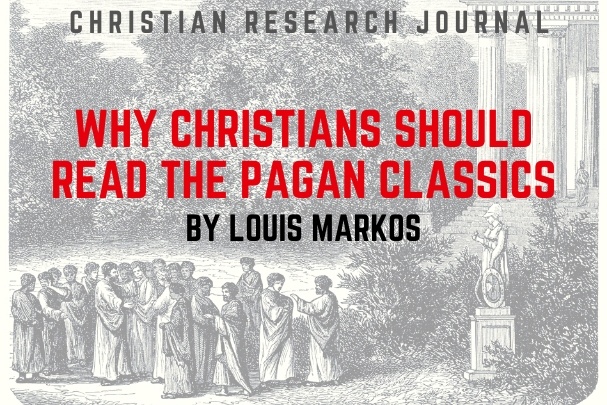This article first appeared in the Viewpoint section of the Christian Research Journal, volume 32, number 2 (2009).
Viewpoint articles address relevant contemporary issues in discernment and apologetics from a particular perspective that is usually not shared by all Christians, with the intended result that Christians’ thinking on that issue will be stimulated and enhanced (whether or not people end up agreeing with the author’s opinion).
For further information or to subscribe to the Christian Research Journal click here.
Tertullian, the toughest and most uncompromising of early church fathers, once asked a question that is still with us today: What has Athens to do with Jerusalem? That is to say, is there— indeed, should there be—a meeting ground between the Judeo-Christian strain that proceeds out of Jerusalem and the Greco-Roman (humanist) strain that proceeds out of Athens?
As far as Tertullian was concerned, the answer to his question was simple: nothing.
Nevertheless, despite Tertullian’s rejection of the link between Athens and Jerusalem, Christian thinkers for the past two millennia have continued to ponder his question. Can the basic tenets and chief embodiments of both Christianity and humanism be combined in a way that will pay homage both to the glory of God and the dignity of man, the truths of Christ and the wisdom of the ancients? What business does a Christian have devoting time and energy to reading works written by pagans who lacked the light of the Christian, or even the Jewish, revelation? Are not all the really important answers to be found in the Bible and the Sacred Tradition? Have not the pagan writers of the ancient world been so superseded by Christianity as to be irrelevant as sources of wisdom in the life of the believer?
Many Christians—particularly evangelicals like myself—are prone to make the claim that the Bible is the ultimate source of Truth. That is not technically true, however. It is Christ, not the Bible, that is the ultimate source of Truth; the Bible is the most perfect and reliable embodiment of that Truth that resides in Christ alone. The distinction here is vital. If it is the living Messiah, and not a single book, that is the source of Truth, then it is possible for that Truth—albeit in a lesser, fragmented form—to appear throughout the imaginative literature of the ancient (pre-Christian) world.
We have all been programmed by our Creator with a desire to seek and yearn after the God who is Truth. If it is true—as Paul teaches in Acts 17:26–28—that we were all made in His image, that He is not far from us, that it is in Him that we live and move and have our being, then surely it must also be true that those timeless works of ancient Greece and Rome that record the musings of some of humanity’s greatest seekers and yearners will contain traces, remnants, and intimations of that Wisdom that made us.
Truth is limited neither to Scripture nor to the Sacred Tradition; the Bible, though it tells us all we need to know to find salvation in and through Jesus Christ, does not attempt or purport to be an encyclopedia of all knowledge and wisdom. Yes, the Bible (the Word of God) is the only perfect written revelation of the truths of Christ (the Word of God), and it is sufficient for “teaching, rebuking, correcting and training” (2 Tim. 3:16 NIV), but I would nevertheless contend that our understanding of the written and incarnate Word of God can be enriched and enhanced by wrestling with the pagan classics. God speaks to us in many ways and through many mediums, and, though Scripture should act as the touchstone against which all such communications are to be measured, we must not allow any “puritan” suspicions of the moral value and doctrinal status of humanistic pursuits to prevent us from accessing these messages from our Creator.
Who, or What, Enlighteneth Us to Truth? What then shall we say if we would build a bridge from Homer, Plato, and Virgil to Christ, the Bible, and the church? Shall we say that Christianity is not the only truth? Certainly not! But let us also not say that Christianity is the only truth. Let us say, instead, that Christianity is the only complete truth. The distinction here is vital. By saying that Christianity is the only complete truth, the possibility of other philosophies, religions, and cultures having hit on certain aspects of the truth is left open. The Christian need not reject the poetry of Homer, or the teachings of Plato, or the myths of the pagans as one hundred percent false, as an amalgamation of darkness and lies, but may affirm that there are moments when Plato and Homer leap past their human limitations and catch a glimpse of the true glory of the Triune God.
I reject the all-or-nothing, darkness-or-light dualism that Tertullian seemed to advocate. But I also reject the modern relativist position that truth is like a hill and that there are many ways around it. Or, rather, I modify that position. Yes, truth is like a hill, but the Truth that stands atop that hill is Christ, and Him crucified. To arrive at the truth of Christ, the peoples of the world have pursued many different routes. Some have only scaled the bottom rim of the hill; others have made it halfway. But many have reached the top, and have experienced that joy that only comes when the truth they have sought all their lives is revealed to them.
Such is the case with the Magi. The Magi were not Jews, and they were obviously not Christians. Most likely they were Zoroastrians whose main vehicle for discovering God’s nature and uncovering His plans was the stars. These astrologers, bereft of the Old Testament, ignorant of the Law and the Prophets, were yet able to identify the divine significance of the Star of Bethlehem. They sought after God—the true God—with all that was available to them, and they opened their hearts to the astounding possibility that what they might find at the end of their journey would draw them to a different and higher truth than the one in which they were raised. They did not know what that truth would be, and yet, as they were—like Cornelius and the Ethiopian eunuch—God-fearing men with a sensitivity to God’s spirit, they knew that when they finally encountered it, they would recognize it. The path they trod to Bethlehem may have led them, geographically, toward the west, but the true spiritual direction in which they journeyed was north, up the hill of truth. At the top they found Christ, the endpoint not only of their Yuletide journey, but of their lifelong yearning for God.
Rediscovering Light and Truth. It is to such pagan seekers, I believe, that Paul refers in the second chapter of Romans: “For when the Gentiles, which have not the law, do by nature the things contained in the law, these, having not the law, are a law unto themselves: which shew the work of the law written in their hearts, their conscience also bearing witness, and their thoughts the mean while accusing or else excusing one another” (14–15 KJV). If we are to accept these verses in a manner that is in any way literal, then we must confess that unregenerate pagans have an inborn capacity for grasping light and truth that was not rendered totally defunct by the Fall.
Indeed, though the pagan poets and philosophers of Greece and Rome did not have all the answers—they couldn’t, as they lacked the special revelation that is to be found only in Christ—they knew how to ask the right questions, the kinds of questions that build within the readers of their works a desire to know the higher truths about themselves and their Creator. Such is the case with the pagan Virgil, whose Aeneid was so Christian in its themes and virtues that Virgil was considered by many medieval theologians and laymen to be a proto-Christian. Even more, his Fourth Eclogue, with its Isaiah-like celebration of the coming of a divine child who will bring peace and order to the earth, was interpreted by most as a pagan prophecy of Christ.
Thus, in the twenty-second canto of the Purgatorio, Dante introduces us to Statius, a first-century pagan poet whom he portrays as having converted to Christianity late in life. Statius ascribes both his early yearnings for Christ and his final conversion not to the Christian martyrs and theologians, but to Virgil. In an ecstatic moment in which pagan past reaches out to Christian present and the two embrace, Statius exclaims:
“You [Virgil] were the lamp that led me from that night.
You led me forth to drink Parnassian waters;
then on the road to God you shed your light.
When you declared [in the Fourth Eclogue],
‘A new birth has been given.
Justice returns, and the first age of man.
And a new progeny descends from Heaven’—
you were as one who leads through the dark track
holding the light behind—useless to you,
precious to those who followed at your back.
Through you I flowered to song and to belief.” 1
He goes on to add that when he first heard the gospel preached, he hearkened to it immediately, for it agreed so well with what he had read in Virgil.
The passage demonstrates how man, though he cannot save himself, can, of his own free will, both move himself and others toward God. In the lovely testimony of Statius, Virgil emerges as a Christ figure, as one who sacrifices himself for others, who devotes his life to uncovering truths that, though useless to him, will provide light and guidance for those who come after. He is a bearer of good news, not of the full gospel of Christ, but of a lesser gospel that yet points to the greater: a candle that directs our eye to the moon; a moon that directs our soul to the sun. Such a man should be included, even if only partially, in Isaiah’s messianic blessing: “How beautiful upon the mountains are the feet of him that bringeth good tidings, that publisheth peace” (52:7 KJV).—Louis Markos
Louis Markos is a professor in English at Houston Baptist University and the author of Lewis Agonistes: How C. S. Lewis Can Train Us to Wrestle with the Modern and Postmodern World (Broadman and Holman, 2003) and Pressing Forward: Alfred, Lord Tennyson, and the Victorian Age (Sapientia Press, 2007). This essay is adapted from the Introduction to From Achilles to Christ: Why Christians Should Read the Pagan Classics (InterVarsity Press, 2007).
Notes
- Dante, The Purgatorio, trans. John Ciardi (New York: Mentor, 1957), 226–27.










